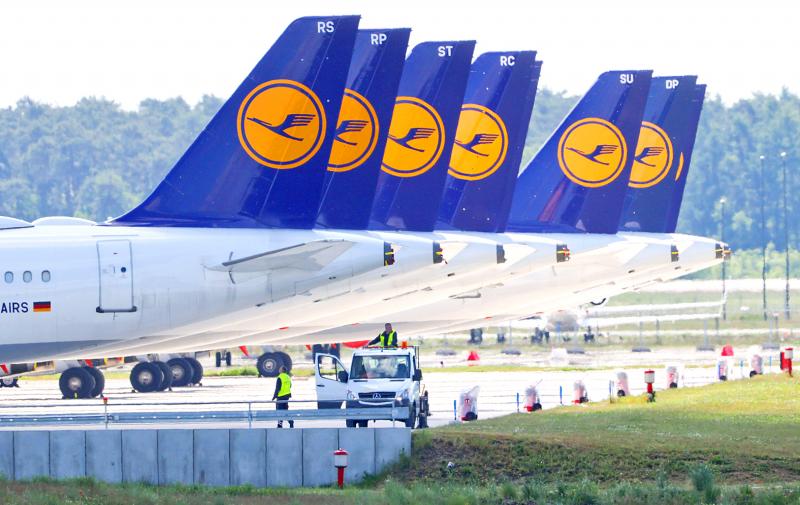German airline giant Deutsche Lufthansa AG yesterday said that it would undergo “far-reaching” restructuring as it posted a first-quarter net loss of 2.1 billion euros (US$2.35 billion), hammered by the COVID-19 pandemic.
“Global air traffic has come to a virtual standstill in recent months. This has impacted our quarterly results to an unprecedented extent,” it said.
“In view of the very slow recovery in demand, we must now take far-reaching restructuring measures to counteract this,” Lufthansa chief executive Carsten Spohr said in a statement.

Photo: Reuters
On top of the collapse in passenger numbers, depreciation of some company assets sapped the bottom line, the statement said.
Falling fuel prices cost the airline 950 million euros, because it had hedged its purchases with much higher-priced contracts.
The first quarter — a slow season for travel — was much worse than the loss of 342 million euros booked a year earlier.
The airline’s supervisory board on Monday approved a bailout deal of 9 billion euros from the German government. The group is to ask its shareholders to back the accord at an online meeting on June 25.
The bailout would see the German government take a 20 percent stake in the group, with an option to claim a further 5 percent plus one share to block hostile takeovers.
That would make the federal government Lufthansa’s biggest shareholder.
Like its rivals, Lufthansa Group — which also includes Eurowings GmbH, Swiss International Airlines AG, Brussels Airlines and Austrian Airlines — has been battered by the pandemic.
The airline said it plans to increase seat capacity in September to “up to 40 percent” of what was expected before the pandemic, and compared with about 3 percent last month.
However, of its 760 aircraft, 300 are expected to remain parked next year and 200 in 2022.
Even with the hoped-for gradual ramp-up of passenger traffic, Lufthansa’s push to repay the bailout cash “will only succeed if we implement restructuring programs in all areas... and agree on innovative solutions with the unions and working councils,” finance director Thorsten Dirks said.
Brussels is slashing its fleet by 30 percent and its workforce 25 percent, while Austrian would have 20 percent fewer planes and aims to cut personnel costs by the same amount.
Over the long term, the flagship airline might have 100 planes too many, giving an overhang of 10,000 jobs, Spohr said last month.
Other divisions at Lufthansa face similar cost-cutting programs, while the company is in talks with aircraft builders to postpone deliveries of new planes and is eyeing sales of non-core business units.
“The uncertain further development of the corona pandemic continues to make it impossible to make a precise forecast of the earnings trend for 2020,” the group said, predicting only a “significant decline” in adjusted operating profit.

Among the rows of vibrators, rubber torsos and leather harnesses at a Chinese sex toys exhibition in Shanghai this weekend, the beginnings of an artificial intelligence (AI)-driven shift in the industry quietly pulsed. China manufactures about 70 percent of the world’s sex toys, most of it the “hardware” on display at the fair — whether that be technicolor tentacled dildos or hyper-realistic personalized silicone dolls. Yet smart toys have been rising in popularity for some time. Many major European and US brands already offer tech-enhanced products that can enable long-distance love, monitor well-being and even bring people one step closer to

TRANSFORMATION: Taiwan is now home to the largest Google hardware research and development center outside of the US, thanks to the nation’s economic policies President Tsai Ing-wen (蔡英文) yesterday attended an event marking the opening of Google’s second hardware research and development (R&D) office in Taiwan, which was held at New Taipei City’s Banciao District (板橋). This signals Taiwan’s transformation into the world’s largest Google hardware research and development center outside of the US, validating the nation’s economic policy in the past eight years, she said. The “five plus two” innovative industries policy, “six core strategic industries” initiative and infrastructure projects have grown the national industry and established resilient supply chains that withstood the COVID-19 pandemic, Tsai said. Taiwan has improved investment conditions of the domestic economy

Malaysia’s leader yesterday announced plans to build a massive semiconductor design park, aiming to boost the Southeast Asian nation’s role in the global chip industry. A prominent player in the semiconductor industry for decades, Malaysia accounts for an estimated 13 percent of global back-end manufacturing, according to German tech giant Bosch. Now it wants to go beyond production and emerge as a chip design powerhouse too, Malaysian Prime Minister Anwar Ibrahim said. “I am pleased to announce the largest IC (integrated circuit) Design Park in Southeast Asia, that will house world-class anchor tenants and collaborate with global companies such as Arm [Holdings PLC],”

MAJOR BENEFICIARY: The company benefits from TSMC’s advanced packaging scarcity, given robust demand for Nvidia AI chips, analysts said ASE Technology Holding Co (ASE, 日月光投控), the world’s biggest chip packaging and testing service provider, yesterday said it is raising its equipment capital expenditure budget by 10 percent this year to expand leading-edge and advanced packing and testing capacity amid strong artificial intelligence (AI) and high-performance computing chip demand. This is on top of the 40 to 50 percent annual increase in its capital spending budget to more than the US$1.7 billion to announced in February. About half of the equipment capital expenditure would be spent on leading-edge and advanced packaging and testing technology, the company said. ASE is considered by analysts